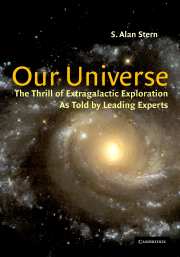Book contents
- Frontmatter
- Contents
- Preface
- The frontier Universe: At the edge of the night
- Part I Revealing a Universe
- Part II Denizens of the deep
- 5 The search for very massive black holes
- 6 Gamma-ray bursts—the most spectacular fireworks
- 7 Clusters of galaxies and the fate of the Universe (Or how to be a cosmologist without really trying)
- 8 Dark matter and the discovery of galactic halos
- 9 Hunting the elusive invisible galaxy
- Plate section
7 - Clusters of galaxies and the fate of the Universe (Or how to be a cosmologist without really trying)
Published online by Cambridge University Press: 03 September 2009
- Frontmatter
- Contents
- Preface
- The frontier Universe: At the edge of the night
- Part I Revealing a Universe
- Part II Denizens of the deep
- 5 The search for very massive black holes
- 6 Gamma-ray bursts—the most spectacular fireworks
- 7 Clusters of galaxies and the fate of the Universe (Or how to be a cosmologist without really trying)
- 8 Dark matter and the discovery of galactic halos
- 9 Hunting the elusive invisible galaxy
- Plate section
Summary
Megan Donahue makes her living studying clusters of galaxies and intergalactic gas, and tending the on-line data archives of the Hubble Space Telescope at the Space Telescope Science Institute. She lives in Towson, Maryland, with her astronomer husband Mark Voit, and their two children, Michaela and Sebastian. Megan was born and raised in rural Nebraska, was an undergraduate in physics at MIT, and earned her PhD in astronomy at the University of Colorado Boulder. She went on to postdoctoral positions at Carnegie Observatories and the Space Telescope Science Institute, where she works now as a staff astronomer. Megan is a bright light among young extragalactic observers, and the coauthor of the astronomy textbook, The Cosmic Perspective by Jeffrey Bennett, Megan Donahue, Nicholas Schneider, and Mark Voit (Addison-Wesley, 1999). Here, she tells us the intertwined story of her own coming of age in science, and a trail of clues that is leading us toward a better understanding of galaxy clusters.
The concept of Fate makes me nervous. Yet, with a handful of observations made from our tiny corner of the Galaxy, we can determine the fate of the entire Universe. We have known since the late 1920s that the Universe is expanding. But what we are just beginning to discover is whether the Universe will expand forever or will eventually stop expanding and collapse in on itself.
- Type
- Chapter
- Information
- Our UniverseThe Thrill of Extragalactic Exploration, pp. 107 - 126Publisher: Cambridge University PressPrint publication year: 2001



